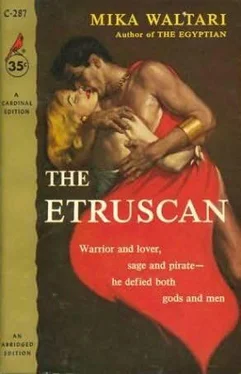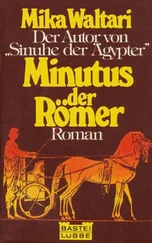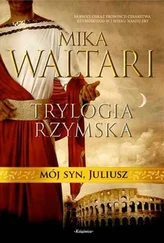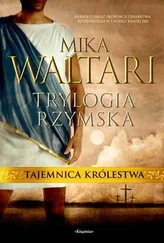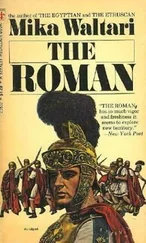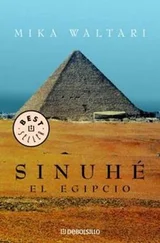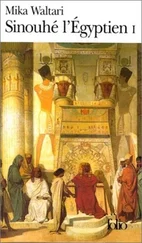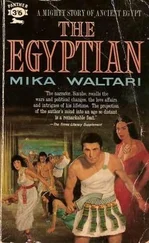Mika Waltari - The Etruscan
Здесь есть возможность читать онлайн «Mika Waltari - The Etruscan» весь текст электронной книги совершенно бесплатно (целиком полную версию без сокращений). В некоторых случаях можно слушать аудио, скачать через торрент в формате fb2 и присутствует краткое содержание. Жанр: Исторические приключения, на английском языке. Описание произведения, (предисловие) а так же отзывы посетителей доступны на портале библиотеки ЛибКат.
- Название:The Etruscan
- Автор:
- Жанр:
- Год:неизвестен
- ISBN:нет данных
- Рейтинг книги:4 / 5. Голосов: 1
-
Избранное:Добавить в избранное
- Отзывы:
-
Ваша оценка:
- 80
- 1
- 2
- 3
- 4
- 5
The Etruscan: краткое содержание, описание и аннотация
Предлагаем к чтению аннотацию, описание, краткое содержание или предисловие (зависит от того, что написал сам автор книги «The Etruscan»). Если вы не нашли необходимую информацию о книге — напишите в комментариях, мы постараемся отыскать её.
The Etruscan — читать онлайн бесплатно полную книгу (весь текст) целиком
Ниже представлен текст книги, разбитый по страницам. Система сохранения места последней прочитанной страницы, позволяет с удобством читать онлайн бесплатно книгу «The Etruscan», без необходимости каждый раз заново искать на чём Вы остановились. Поставьте закладку, и сможете в любой момент перейти на страницу, на которой закончили чтение.
Интервал:
Закладка:
Dorieus lashed at the rocks impatiently with a willow switch. “I have been trained for war and for life with my own kind. Solitude and idleness merely breed foolish thoughts. I begin to doubt the oracle and her withered priests. After all, my problem is political, not divine, and as such can be better solved with the sword than by chewing on bay leaves.”
“Let me be your oracle,” I suggested. “We are living in a period of upheaval. Go east with me, across the sea to lonia, where they have danced the dance of freedom. Persian reprisals threaten the insurgent cities. A trained soldier would be welcome there and might win much booty and even rise to be commander.”
He said reluctantly, “We men of Sparta do not love the sea, nor do we interfere in matters beyond the sea.”
“You are a free man,” I insisted, “and no longer bound by the prejudices of your people. The sea is glorious even when it surges with foam, and the cities of lonia are beautiful, neither too cold in the winter nor too hot in the summer. Be my companion and go east with me.”
At that he suggested, “Let us each toss a sheep’s bones to indicate the direction that we must follow.”
By the rocks of the underground gods we tossed the sheep’s bones three times each before we believed them. Each time they clearly pointed westward, away from lonia.
“There is something wrong with them,” said Dorieus in disgust. “They are not prophetic.”
His words unconsciously revealed his desire to join me in the war against the Persians. With feigned reluctance I therefore said, “I myself have seen a replica of Hecataeus’ map of the world. Undoubtedly the Great King is a formidable opponent, for he rules a thousand nations from Egypt to India.”
“The stronger the opponent the more honorable the battle,” retorted Dorieus.
“I have nothing to fear,” I observed. “How could human weapons harm me when a thunderbolt failed to do so? I believe myself to be invulnerable. But it is different with you, so I will no longer try to persuade you to join me in an uncertain venture. The bones point west. Believe them.”
“Why don’t you go west with me?” he asked. “As you said, I am free, but my freedom is bleak unless I have a companion with whom to share it.”
“Both the bones and the priests indicated the west, but it is precisely because of that that I shall go east. I must prove to myself that omens and divine warnings cannot prevent my doing what I will.”
Dorieus laughed. “You are contradicting yourself.”
“You don’t understand,” I said. “I want to prove to myself that I cannot escape my fate.”
At that moment the temple servants came for Dorieus. He rose from the rock, his face alight, and ran toward the temple. I waited for him by the large sacrificial altar.
When he returned his head was bowed. “The Pythia has spoken and the priests have studied the omens. Sparta is threatened by a curse should I ever return. Therefore I must sail beyond the sea. They recommend that I go west, where any tyrant of a wealthy city would be happy to take me into his service. My grave will lie in the west, they said, and there too I will find undying fame.”
“Hence we shall sail east.” I smiled. “You are still young. Why should you unnecessarily hasten to your grave?”
On that very day we left for the coast, only to find that the sea was stormy and that the ships had ceased to sail. And so we undertook the journey by land, spending our nights in deserted shepherds’ shelters. After we had passed Megara we had to decide how best to reach lonia. I had friends in Athens among those who had participated in the expedition to Sardis, but because a conservative faction had gained power there the friends might not wish to be reminded of their past.
Corinth, on the other hand, was the most hospitable of Greek cities. From its two harbors ships sailed both east and west and even Phoenician vessels put in there freely. I had also heard that strangers were not shunned there.
“Let us go to Corinth,” I suggested. “There we will hear the freshest news from lonia and will be able to sail in the spring at the latest.”
Dorieus became glum. ‘‘We are friends, and as an Ionian you are more familiar with travel and cities than I. But as a Spartan I cannot follow another’s advice without protest.”
“Then let us toss the sheep’s bones once more.”
I drew the cardinal points on the sand according to the sun and indicated the positions of Athens and Corinth as well as I could. Dorieus tossed the bones and they indisputably pointed west.
Morosely he said, “Let us go to Corinth. But this is my decision and not yours.”
Because his will was stronger than mine, I confessed, “I am pampered by Ionian customs. My mind has been spoiled by the teachings of a sage who despised people. Whatever increases knowledge consumes the will. Hence let us obey your will and journey to Corinth.”
His face brightened, he smiled, ran and threw his javelin as far as he could in the direction of Corinth. But when we reached it we saw that it had struck a rotted piece of ship’s rail that had been washed up by the sea. We both felt the omen to be unfavorable although we said nothing and avoided each other’s eyes. Dorieus pulled loose the javelin and we set off in the direction of Corinth without a backward glance.
8.
In Corinth a stranger is not compelled to stay with friends, for the city has inns where one can obtain food and lodgings. Nor is a stranger judged by his face, clothes or even the color of his skin, but solely by the weight of the bag in which he carries his money. I suspect that the majority of the city’s residents follow no honest trade but have as their sole profession the aiding of strangers to spend their money as rapidly as possible.
Upon our arrival we found many refugees from the Ionian cities. Most of them were wealthy people who, though they feared freedom and the will of the people, feared Persian vengeance even more. They were certain that reprisals awaited all the Ionian cities which had banished their tyrants, torn down the Persian buildings and replaced the ridge-stones of their walls. Many of the refugees were waiting for spring so that they might sail on the merchant vessels to the large Greek cities in Sicily or Italy and thus be as far from the Persians as possible.
“In the west is a greater Greece with rich cities and room to breathe,” they said. “The future lies in the West, while only destruction and ceaseless oppression lie in the East.”
But they had to admit that the uprising had spread as far as Cyprus, that Ionian ships ruled the sea, and that all the Ionian cities were again participating in the revolt.
With the arrival of spring we sailed to lonia on one of the first vessels.
Book Two
Dionysius of Phocaea
1.
In the war against the Persians I won fame as a man who laughed because he did not fear death. Dorieus for his part became famous for the sense of security provided by his leadership.
But when the Persians had blockaded Miletus by land, Dorieus said, “Although Miletus still protects the Ionian cities which lie behind its back, every Ionian here fears for his native city and that fear is responsible for the confusion around us. Besides, the Persians are stronger on land than we are. Our fleet, however, is still intact behind the Lade peninsula.”
Dorieus was now a bearded giant with a crest of plumes on his helmet and silver tracings on his shield. Looking around him he said, “This city with its wealth and its impregnable walls has become a trap for me. I am not accustomed to defending walls, for a Spartan’s shield is his only wall. Turms, my friend, let us leave Miletus. This city already smells of death!”
Читать дальшеИнтервал:
Закладка:
Похожие книги на «The Etruscan»
Представляем Вашему вниманию похожие книги на «The Etruscan» списком для выбора. Мы отобрали схожую по названию и смыслу литературу в надежде предоставить читателям больше вариантов отыскать новые, интересные, ещё непрочитанные произведения.
Обсуждение, отзывы о книге «The Etruscan» и просто собственные мнения читателей. Оставьте ваши комментарии, напишите, что Вы думаете о произведении, его смысле или главных героях. Укажите что конкретно понравилось, а что нет, и почему Вы так считаете.
